The Democrats need to put into a coffin the idea that “Hope” should ever be a main political theme. Better theme? Kicking ass. Kicking ass is for ass-kicking Americans. That’s what *America* is today. Anybody who is an American sports fan will understand the value of kicking ass.
[ the first of my traditional end-of-the-year essays ]
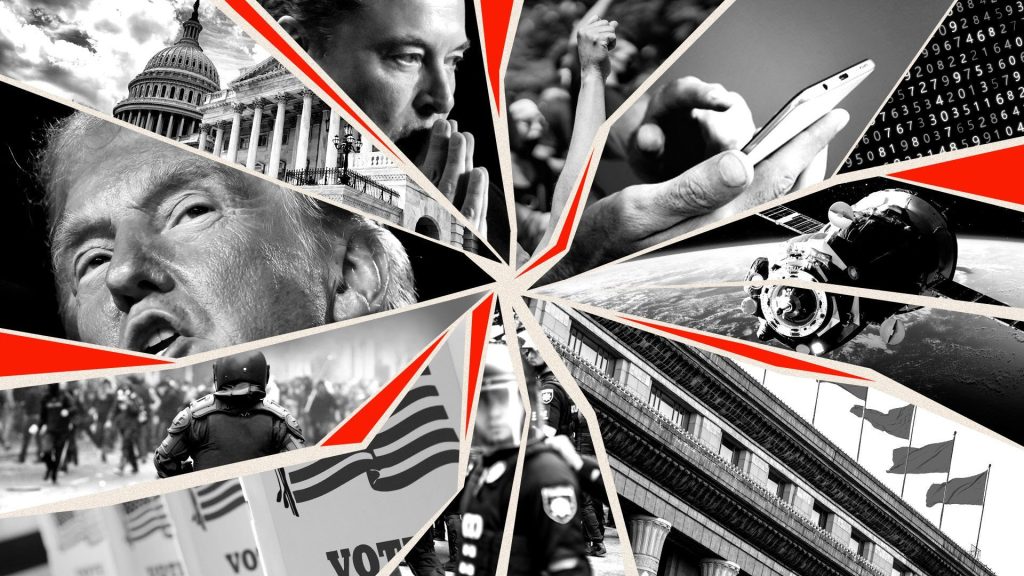
13 December 2024 — Frankly, I never saw the fascination with American football. I have never been a fan, even as a kid. I always saw it as the NFL/collegiate powers’ mercenary marriage of patriotism, military, violence and unquestioned loyalty. With its military-like strategy on the field and its culture of conflict and male solidarity. An American “cultural thing” that permeates living rooms and language, and even the holidays. I have never seen it as a “sport”. Too much religious, quasi messianic tonalities, resonant with awe, horror, and excess.
Yes, the game itself is undeniably alluring. But football is a uniquely American spectacle: fast, brutal, complex, colorful.
But in the last 5-8 years the NFL has been mired in scandals and controversy — over players’ health and safety, domestic violence, race relations, players’ right to protest, and the rise of sports gambling. But now – the league is enjoying record ratings, embracing new fans and expanding into international markets.
Why? Credit Katie Hill, the league’s senior vice president of communications. She constructed a clear, concerted plan around one key message — “football is for everyone” — which helped the league escape its polarization.
But her strategy was far trickier, and more nuanced. The league had to take its messages to audiences that are a sprawling ecosystem of stakeholders with competing agendas. In an interview earlier this week Katie Hill said (the red emphasis is mine):
“It used to be that you communicated with one voice to all of the stakeholders at once, but that isn’t the case anymore. We need to think about our fans, our players and our players union, our teams, our team owners, the team employees, the league office employees, our sponsors and partners, regulators and public officials, critics and the number of advocacy groups who we support as each a separate audience, and tailor our message for each audience“.
Oh, and the most famous person in the world didn’t hurt. She admitted that:
“Look, Taylor Swift has been incredible for the NFL. There is no question that she has led to an influx of female fans and new people watching our game. Game attendance, merchandise purchases, etc. by female fans has spiked”.
But the most important point she made was: we support each separate audience, but we tailor the message for each audience.
And this is exactly what Donald Trump did during the election.
Because Donald Trump didn’t just run a political campaign; he launched a full-scale marketing movement. Love him or loathe him, one thing’s for sure — Trump’s approach to winning over voters felt a lot like your favorite brands winning over consumers. He applied some tried-and-true marketing principles to secure his victory, and why his playbook might look familiar to anyone in the advertising world.
If Trump’s campaign had a tagline, it was something like, “I’ll fix it”. Depending on his audience, the message was simple and aimed directly at voters’ biggest pain points: the economy, safety, and national pride. Much like Nike’s “Just Do It,” which invites customers to achieve greatness in a few simple words, Trump’s message was clear, motivating, and easy to remember.
Instead of weighing people down with policy jargon (the Kamala Harris approach), he cut right to the chase, letting voters know exactly what they’d get with him. Imagine the Trump campaign team brainstorming “How about something like we’ll enact comprehensive economic and geopolitical reform initiatives?”
Nope. They kept it tight and relatable. Expensive groceries, immigrants taking jobs, no longer any American pride overseas, etc. Coke and Nike have been doing it for decades. It turns out, so was Trump.
Trump’s campaign tapped deep emotions — discontent with the economy, anxiety over safety, and hope for a better future. His ability to stoke these feelings made his base incredibly loyal and engaged. Trump’s messaging resonated similarly, creating a connection with his audience that went beyond policies. He didn’t just present himself as a candidate — he became part of people’s identities, hopes, and dreams.
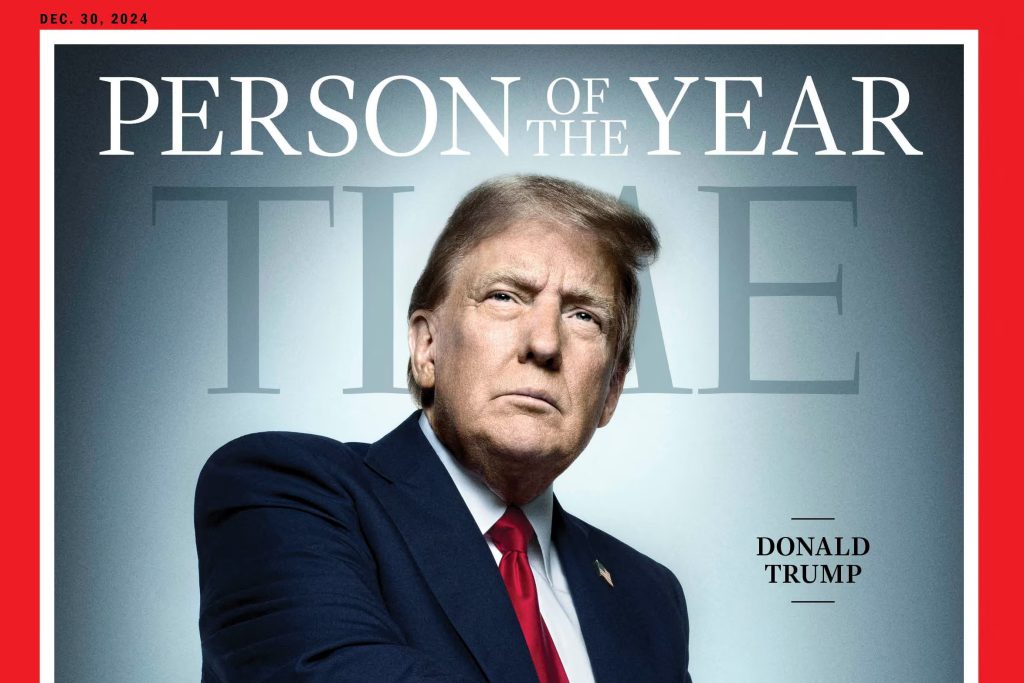
So it is no surprise that Time magazine named him “Person of the Year”. Granted, today this is more of a PR ploy as the mainstream press struggles to stay relevant, bleeding subscriptions and followers. But it is also another alarming example of anticipatory obedience, which is something the press has done in every fascist regime in history: “we’ll be nice, so we don’t come too heavily under fire and you can unload on the other guys/girls who are showing more courage than we are”. It’s why Mark Zuckerberg (ok, Meta) donated $1 million to Trump’s 2025 Inauguration – to court favor. The company didn’t contribute to Trump’s first inaugural in 2017 or to Joe Biden’s in 2021.
But the Time title has historically been bestowed on figures who have dramatically shaped global events, good and bad (Hitler made it in 1938) from world leaders to cultural revolutionaries. It serves as a barometric reading of contemporary significance. Every U.S. president since Franklin D Roosevelt (who was named 3 times), except for Gerald Ford, has worn the crown at least once, making Time’s annual selection a sort of presidential rite of passage. Now he is a two-time winner. And the title also underscores Trump’s persistent gravitational pull on the global narrative, despite – or perhaps because of – his tumultuous political trajectory and criminal history, which culminated in a decisive presidential election win in November.
I’ll come back to this in more detail in my Conclusion. But it’s important to note now because this has all given Trump carte blanche to do what he wants (along with the *permission* granted by the U.S. Supreme Court) – if he chooses. And we really need to thank Trump for telling us exactly what *America* has become, as I explain in my conclusion.

Governance, media, business and global geopolitics are all being reordered at breakneck speed — all simultaneously. It’s being called “The Great Upheaval”. We’re witnessing more change, across all parts of life, at more speed, than ever before. This means opportunity – and new threats or surprising shifts – pop up faster and faster. Anticipating change is tougher than ever.
There are several causes: a global populist surge, an AI arms race, shifting political alliances globally and domestically, and radical changes in how people worldwide get and share information. President-elect Trump’s governing plans are designed to exploit this emerging phenomenon — and speed it up, his advisers tell us. Elon Musk routinely tells Trump this will be the most dramatic transformation of business, governance and culture since the nation’s founding. It’s classic Musk salesmanship, as we’ve seen with cars: Promise vast, immediate change — regardless of feasibility.
Note to readers: but Trump has a key “permission slip” given to him by the U.S. Supreme Court. More below.
Musk, newly appointed White House AI and crypto czar David Sacks, and many others see explosive change hitting energy, space, new technologies, crypto and tangential businesses. The new Trump team believes government needs to be an accelerant, not a deterrent. This means making agencies leaner, at least in decision-making, and more biased toward pro-business action.
The risk? The shifts benefit the architects more than the general public. Musk, Sacks, the Trumps and many incoming leaders are super-wealthy, and deeply invested in the areas set to take flight. This upheaval benefited Trump, but it very much transcends him and the coming four years of governance. The forces set in motion are bigger than one moment, or one man, or one nation. I do not normally read any of Eric Schmidt’s books (he being the former chairman and CEO of Google) but in “Genesis” (written with Craig Mundie and the late Henry Kissinger) he gets one thing right:
“The most important thing many people don’t know is that tech is now working at mega scale — ‘everything everywhere all at once’ – and this is due largely to scale computing (huge computational and network resources) and the application of AI to everything”.
For instance, Schmidt is the lead investor in Samaya AI, which is building a financial AI platform designed to leverage AI agents for complex, high-value tasks. Businesses will make more money and be more efficient if they move quickly to adopt these AI agents.
And that’s the “Big Picture”, if you will. This is a global phenomenon and intensifies — and raises — the stakes of the U.S. vs. China in the war for international dominance. China and the United States are winners since they’re the countries most dominating the new technologies and relevant supply chains.
But there’s broad agreement “The Great Upheaval” is hitting everyone, everywhere. The following is just a small snapshot of the tectonic plates shifting at once:
• AI arms race. This is the fixation of the most powerful people at the most powerful companies in the most powerful nations. The sheer magnitude of intellectual and financial investment guarantees massive disruption, even if it never meets the epic expectations. This is making Big Tech leaders geopolitical actors in their own right.
• AI-adjacent surge. These technologies eat up unfathomable energy and data, driving everyone from Musk to Meta to invest billions in new sources of both. Much of this is U.S. investment, which will impact state economies and politics. As Schmidt notes in his book: “We need much more electricity in the U.S. to power these data centers. We can use foreign data centers but they are less secure”.
• Space war. Another AI adjacent boom. The future of warfare is robots, drones and satellites — not boots on the ground. The nearly trillion-dollar defense budget will shift in this direction. Think about the consequences: Oceans will no longer protect against invasion. A nation’s tech will matter more than its conventional military might. As I wrote several weeks ago, Americans see the world, are divorced from the world, because it is the only great power in the history of the world that has had the luxury of having non-predatory neighbors to its north and south, and fish to its east and west – iliquid assets. Canadians, and Mexicans, It allowed an unprecedented degree of security, a huge margin for error in international affairs – and the luxury of largely unfettered development. Now it no longer affords complete protection.
• Information wars. We used to get most of our information from “the news.” Now, the information in our life pours in from a host of random inputs: a podcast … someone tweeting … a Substack … a snippet of video – the sum of all the noise in our day and on our phone. And pay attention to the info flows to particular populations. Our new information cascade is easier to manipulate than the traditional sources of rigorous reporting we all grew up on. Our information diet is blowing up before our eyes, as attention shatters into scores of pieces based on location, job, wealth and politics. This dynamic is true around the globe, and it is enhancing the power of authoritarian regimes.

No institution has given Trump more power – the “keys” – to destroying the administrative state and the judicial/legal system than the U.S. Supreme Court. But this has been building for years. It is a long story, deserving of a more detailed post so herein just a few key points. And it involves (of course), money and power. Because in America it is always about, only about the money.
And a few things up front. The U.S. legal “system” is a misnomer. It implies that it was intentionally designed to render *justice*. As Trump showed, it is a sham. Trump showed the world the U.S. legal *justice system* simply does not exist. It is a fantasy. The system pretends to desire “the truth” to “serve justice” – but it is simply a trillion-dollar money machine that requires lawyers to argue their point. The best argument wins. The truth is irrelevant. Trump has proved a rich man in the U.S. can purchase the law. In corporate law, a company can beat down its smaller opponent by making a case too expensive to pursue.
Trump has dallied, delayed, and paid lawyers (with other people’s money) since he attempted to overthrow the 2020 election – and he has succeeded. Where he has been found guilty, he has avoided sentencing. Where he has been ordered to pay compensation, he has not paid. He has shown he is above the law. He has shown that with enough cash for lawyers, the rule of law, the truth, and the very fabric of civilization is a house of cards.
Through that realistic lens, Trump had a huge advantage in the justice system. He has:
• an array of lawyers to delay and obfuscate and play every aspect of the Byzantine structure of the American legal system
• deep pockets
• the federal judges he appointed
• a cult following, and an ability to sway public opinion, which is political power
• volumes of experience in showing he is a singled-out victim
Trump learned the way to win is to cut every corner, trample on every ethical guideline, while his opponents primly weighed up the legal niceties and nuances. They were thumbing through the rulebook of the monastery – while in front of them a mafia don has set the monastery on fire.
And not just Trump. The corporate legal community does the very best at decimating the system. Just read two books I have quoted numerous times in my posts: Katharina Pistor’s “The Code of Capital” and Bruce Gibney’s “The Nonsense Factory”, withering examinations of how the American legal system has been gutted – by the attorneys in the system, themselves.
And it continues to boggle my mind that, under Biden, the United States became the first country to face an attempted coup and not only fail to punish the coup plotters but allow them to hold office and make laws. There is no parallel in world history. For God’s sake, even Hitler had a prison interlude between his putsch and his presidency. The only thing approaching an equivalent lies in the American past: the refusal to punish confederates and instead let them regroup under new names, leading to the decimation of Reconstruction and the birth of Jim Crow.
I think it is fair to say America passed *reason* two or three election cycles ago, and decimated its *justice* system long ago. Pity the U.S. cannot invade itself to restore democracy. It will get even uglier. What Trump and his sycophants have unleashed cannot be put back in the bottle. Only the naïve still believe it can be reversed.
Ah, but the true power that Trump will rely on to *reconfigure* America is due to one man.
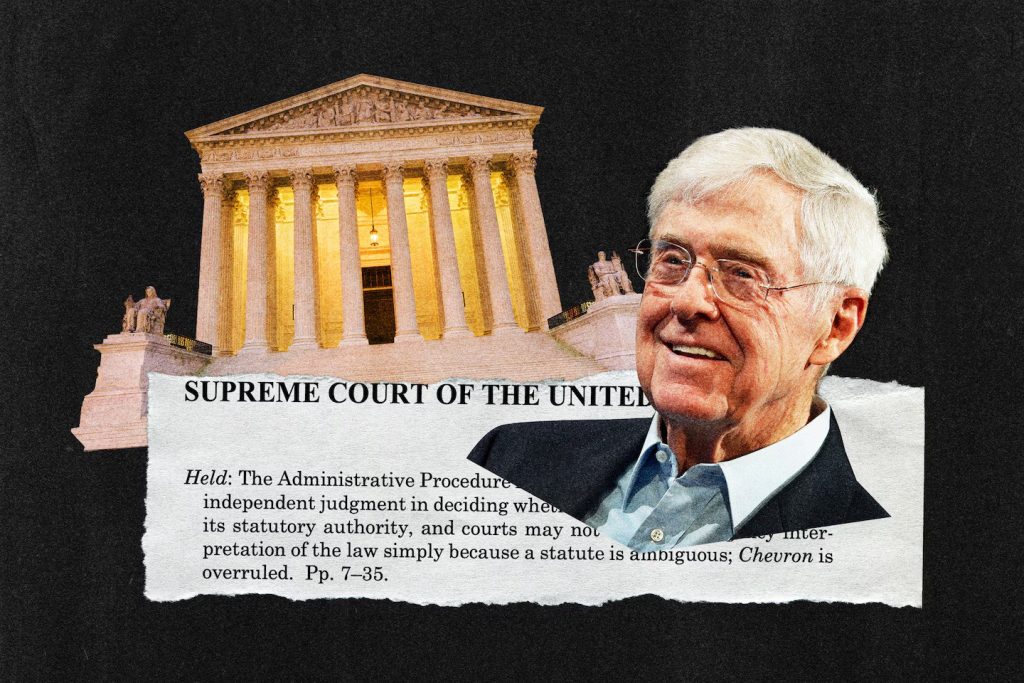
It seemed to start so simply, but it was a long time in coming.
The 2019 Seafood Expo North America in Boston featured an oyster-shucking contest, whole squid on ice and some surprising attendees: attorneys from the powerful political network of Charles Koch, a billionaire who has spent decades and millions fighting government regulation. They weren’t there for the seafood samples. They were fishing for fishermen, seeking stories of boat captains upset by federal regulations that would soon require herring fishermen to pay for onboard government monitors. The outreach demonstrated the unusually broad coordination by the Koch network to challenge a bedrock legal precedent that had touched many aspects of American life — from drugs and the environment to banking and workplace safety.
But as angry as the fishermen were, they did not have the resources to mount a major legal fight. That would take millions of dollars and the painstaking work. And so the Koch network of associated legal groups stepped in.
That effort culminated in June 2024 when the U.S. Supreme Court struck down the principle known as the Chevron deference, which for 40 years had required judges to give federal agencies significant latitude in implementing laws in areas where Congress did not give specific guidance. Other Supreme Court decisions last term garnered more attention, including on abortion pills and presidential immunity. But most legal experts said Chevron would be one of the most significant rulings of this generation because of its sweep to change American society.
Chevron was THE major case
Like many of my readers, I read (or at least scan) almost every Supreme Court opinion. I’m not about to summarize last Term but just highlight a few points on Chevron, and the enormous Koch network behind it.
The Chevron legal precedent had been cited in more than 18,000 decisions over the past four decades. Its demise has unleashed a new flood of challenges to the regulatory power of federal agencies, and Elon Musk and Vivek Ramaswamy seized on it last month as a key tool in their quest to slash thousands of federal jobs and dismantle the Federal bureaucracy as part of the incoming Trump administration. Yesterday, Trump quoted it as a method to roll back (eliminate?) environmental regulations.
But there is a huge inside story of how a network of interconnected organizations — with common employees and funding from Koch and wealthy like-minded donors — spent years strategizing how to take down Chevron, ultimately finding the test case they needed to upend decades of precedent. The Washington Post has been doing a series. Their reporters interviewed dozens of lawyers and strategists involved in the Chevron case and other key Court opinions, reviewed hundreds of pages of tax records, traced millions in funding and reviewed a recording of Koch-aligned groups discussing the case in private. The following will be a few points from Parts 1 and 2 of that series, plus my own research.
The bottom line is that The Washington Post reporting provides fresh detail about how the network supported the legal fight against Chevron. Koch-funded charities pumped at last $18 million (likely more) in recent years into the New Civil Liberties Alliance (NCLA) and Cause of Action, the public interest firms that brought the lawsuits. The battle against Chevron was often publicly portrayed as the saga of a group of scrappy fishermen taking on the federal government.
But behind the scene, the Koch funded NCLA and Cause of Action drove the case, identifying the regulation to challenge, recruiting plaintiffs and drafting one lawsuit before the regulations went into effect. And providing lots and lots of $$$$. My favorite quote from the Post series was from James Valvo, executive director of Cause of Action:
“We knew we had to have everything in place beforehand: clients signed, complaint written, ready to go — so when this rule came out, we could sue immediately. We had been planning this moment for years”.
The 6-3 Chevron ruling was one of a string of anti-regulatory wins at the high court — almost all powered by Koch money and groups — that have curbed federal regulatory power in ways not seen for decades. Supporters say the decisions are a necessary correction to a federal government that overburdens business and stifles innovation. Critics say dismantling agency guardrails will make America less safe, sicker and more polluted.
The Charles Koch PR machine said:
“The role Koch’s network played in Chevron’s demise was no different from that played by other groups across the political spectrum, which also try to shape policy and legal challenges. Chevron is an example of one way constitutional government was breaking down. What Chevron was saying, it’s not really the courts that interpret the laws, it’s the executive branch”.
Days before the Supreme Court ruling was issued, an alliance of groups that have received Koch funding for years was already looking beyond the demise of Chevron, according to a recording of a conference call reviewed by The Post. It seems *somehow* the 6-3 vote was leaked out days before the opinion was actually issued. In that conference call participants discussed a “hit list” of regulations to challenge, using a surprising road map: legal briefs filed to the Supreme Court by Chevron supporters that documented how its fall could endanger particular regulations.
Note to readers: and *strangely* it seems Elon Musk and Vivek Ramaswamy have been copied in on all of this to put together their own “hit list”.
Slaying the “beast”
As I noted in a long piece last year about the Chevron case, Koch and his brother David (who died in 2019) have worked since the early 1970s to create a constellation of foundations, political action groups and legal organizations that reflect their libertarian beliefs, aimed influencing public policy, elections and law. Insiders say the number of people working at these entities number 3,000+ – – all seemingly working on Koch motivated projects. But there is a looooong history here. Somebody unearthed a speech Charles Koch made in 1974. One bit:
“We have confiscatory taxation, wage and price controls, commodity allocations programs, trade barriers, restrictions on foreign investments, so-called equal opportunity requirements, safety and health regulations, land use controls, licensing laws, outright government ownership of businesses and industries and many more interventions. No advocate of free enterprise should confuse all of this with a free, capitalistic economy. This must be corrected. It will take time, but we have the resources, we have the commitment”.
Christopher Leonard, whose book “Kochland” explores the business empire, said those views were deeply held, but also served the bottom line of Koch’s holdings in oil, timber, agriculture and other sectors. Koch Industries has faced tens of millions in fines and has repeatedly tangled with regulators over the decades. It is the nation’s second-largest privately held company. Leonard said Charles Koch applied his boardroom skills to his nascent political project. It is an excellent book. I highly recommend it to understand who controls America, and how our political systems really works. In an interview promoting the book, Leonard said:
“Charles Koch is a guy whose day job was rooted in managing highly, highly complex systems — oil refineries, natural gas refineries, pipelines, oil shipping tankers. He really has a mind for seeing how complex systems interact at different points and figuring out how to get into a complex system and make a lot of money. I say that, because his approach to politics is exactly the same way. His methodology is brilliant”.
The Koch vision eventually dovetailed with one offered by the one of the intellectual architects of Chevron’s dismantling, Columbia University professor Philip Hamburger. Hamburger laid out his case against Chevron in a 650-page tome published in 2014, arguing that the regulatory powers exercised by federal agencies since the New Deal have no constitutional basis. The regulatory state had become a “beast” threatening to devour America, Hamburger said in a 2022 speech marking the NCLA’s fifth anniversary: “It just eviscerates the Bill of Rights. It takes a knife to it just as you gut a fish”.
The dramatic language crystalized the alarm of conservatives and libertarians who had watched with trepidation such things as the creation of the muscular Consumer Financial Protection Bureau in 2011, and President Barack Obama’s attempts to circumvent a deadlocked Congress with agency action on climate change and immigration.
Hamburger created the NCLA in the mold of the NAACP or ACLU, with the goal of battling the federal bureaucracy — the first legal organization in the nation solely dedicated to that cause. Instead of fighting individual regulations, he wanted his group to concentrate its impact by launching multiple lawsuits targeting the pillars, like Chevron, that support federal regulatory power.
At first, Hamburger said in an interview, his plan struggled to gain traction. But in 2017, he received $1 million from the Charles Koch Foundation, which was the lion’s share of donations he used to launch NCLA. And Koch then continued to fund it, plus related organizations. Hamburger hired former Koch Industries in-house counsel Mark Chenoweth to run the group.
Building the network
The network is simply astounding and I’d need to pull out chunks from the several books I have read. Suffice to say Koch money kept flowing to the NCLA. Nonprofit organizations generally do not have to report donors, but The Washington Post was able to track nearly $7.2 million from Koch-funded charities through tax records that list the philanthropic giving, which amounts to about 35 percent of NCLA’s budget.
And that is just the tip of the iceberg. The Charles Koch Foundation donated $1 million each year between 2017 and 2020, while an arm of Stand Together that awards fellowships kicked in more than $1 million in 2020. A third group, the Charles Koch Institute, ponied up $1.1 million the next year. Another Stand Together offshoot, a trust, followed up with more than $1 million in 2022. The Post estimates that Koch has made about $75 million in donations across the entire network – so far.
But is hard to estimate. Critics say the funding structure is intended to obscure the Koch role in groups like NCLA. In those early years, Democrats routinely targeted the Kochs and their spending as symbols of wealthy interests having outsize political influence. Stand Together officials say Koch simply has a massive charitable operation that gives away millions to hundreds of groups each year. There is nothing illegal about that.
Remaking the court
Donald Trump’s surprise 2016 victory prompted intense speculation about the future of Roe v. Wade, the landmark case that guaranteed a federal right to abortion, as well as how the new president might fill the Supreme Court vacancy created by the death of Antonin Scalia months earlier. Far less noticed was another priority for Trump officials. Donald McGahn, the White House counsel, told a Federalist Society gathering in 2017:
“Regulatory reform and judicial selection are the two greatest legal issues that this administration will address. The greatest threat to the rule of law in our modern society is the ever expanding regulatory state. The most effective bulwark against that threat is a strong judiciary. We will make that happen”.
McGahn handed out Hamburger’s writings (the chap I noted above) to members of his staff in the White House counsel’s office, which helped pick Trump’s justices. Potential nominees were also vetted by Leonard Leo, co-chair of the Federalist Society, which gets significant funding (35%) from the Koch network.
Koch had famously declined to support Trump in 2016, and the future president had railed against the Koch brothers in campaign appearances as enemies of his populist agenda. But it was political theatre. Koch network alumni took key roles in the new administration, and their philosophy permeated the White House. Koch played a very nimble game with Trump. “Block and tackle”, to use Leonard’s phrase in his book “Kochland“, referenced above. They tried to block the stuff they didn’t like, or just not participate. But for the stuff the Kochs liked about MAGA, they did everything they could to support the agenda. And funded it liberally.
Note to readers: McGahn had been a lead attorney for the Koch-funded Freedom Partners Chamber of Commerce. Marc Short was president of the same organization before backing, as Trump’s legislative director, the nomination of Justice Neil M. Gorsuch to the court. He became chief of staff to Vice President Mike Pence. As a congressman, Pence recruited legislators to sign a pledge against a fossil fuel tax, a campaign spearheaded by Americans for Prosperity. David Koch was one of the largest single donors to Pence’s various political races, and Pence has appeared at Koch events.
Deregulatory sentiment was a consensus across the board in the Trump administration. It will dominate Trump 2.0.
And as I am sure many of my readers know having followed the story, Gorsuch fit the template McGahn laid out in his Federalist Society speech; he was deeply skeptical of government regulation and had written an opinion arguing against Chevron. Americans for Prosperity launched door knocks, targeted ads and town hall events aimed at pressuring senators to approve his nomination — the group’s first-ever campaign for a Supreme Court nominee. The organization went to work again in 2018, when Trump nominated Brett M. Kavanaugh, another Chevron critic. It did the same two years later for Amy Coney Barrett, Trump’s final nominee. 3-for-3. Nice work. And I am not even mentioning the work the Federalist Society did to get John Roberts and Samuel Alito on the Court.
So the fix was in. The high court now had a conservative supermajority.
But one small issue. The dean of that bloc, Clarence Thomas, had written a 2005 opinion upholding the legal precedent set by Chevron, writing that Chevron’s premise “is for agencies, not courts, to fill statutory gaps”. In early 2020, however, Thomas created a buzz in legal circles when he repudiated that position.
Thomas never publicly explained his change of heart, but it was a flip made by many conservatives, who had seen Chevron in earlier years as a check on liberal judges. However, 3 years after Thomas’s dissent, Propublica revealed previously undisclosed ties between the Thomas and the Koch network, reporting that Thomas spoke at a winter summit for Koch donors in 2018 and regularly interacted with the Kochs at the annual all-male retreat in California known as Bohemian Grove, which Thomas has attended for about 25 years. Democrats and court ethics groups called for Thomas’s recusal from the Chevron case, which by then had been accepted on the docket. Thomas chose not to step aside.
The court has ushered in a new era of diminished regulatory power.
The demise of Chevron
The decision at the end of June went even further than some in the conservative legal groups had hoped. Chief Justice John G. Roberts Jr. authored an opinion calling Chevron a “judicial invention” that required judges to disregard their duty to interpret the meaning of statutes. Judges would no longer give deference to agencies on ambiguous regulations, his majority ruled. The Koch group was actually a little surprised they got pretty much a win on all counts.
In a dissent read from the bench, liberal justice Elena Kagan accused the majority of setting itself up as “the country’s administrative czar.” She said agencies are better suited than judges to implement complicated, technical regulations because of their expertise.
The long-term effects of the ruling are still unfolding, but there are indications that the balance of power has already changed — and not in the government’s favor. The ruling was cited at least 26 times by court of appeals judges in July and August, according to a Bloomberg Law tally. Those courts struck down regulations in four cases, halted rules in 15 others and denied the government’s request for a temporary pause in three instances. Only in four of the 26 cases did the government prevail.
With a new term underway, legal experts say they expect the court’s majority to continue to limit the power of federal agencies. Yes, overturning Roe is a lightning rod that gets more press attention, but I would say overturning Chevron was a huge legal victory for limited-government conservatives. People will look back on it as one of the most significant legal decisions in our generation.
And now, the aftermath. A member of the Trump transition team said they are making a “hit list” of regulations they want gone.
The critics? Small-business groups said government loan programs would be badly disrupted, and civil rights lawyers said anti-discrimination protections in housing and employment would be undermined. A coalition of Democratic-led states warned that Medicaid, one of the biggest and most complex programs across government, would be thrown into disarray. The next phase in the “pincer movement” against federal regulation will be an attempt to restrict Congress from delegating powers to federal agencies in the first place. The same players behind the attack on Chevron will be involved again. There’s a lot of stuff teed up to restrain the ability of Congress to just write a blank check to government agencies.
And over at the Court? The Supreme Court has not used the non-delegation doctrine to strike down a ruling since 1935. But the justices announced last month that they would hear a pair of cases on that issue. Last month, at a Federalist Society panel discussion in Washington, D.C., Hamburger opened a bottle of champagne to celebrate the demise of the “administrative state.” The crowd cheered as the cork popped. “This is just the beginning,” Hamburger said.
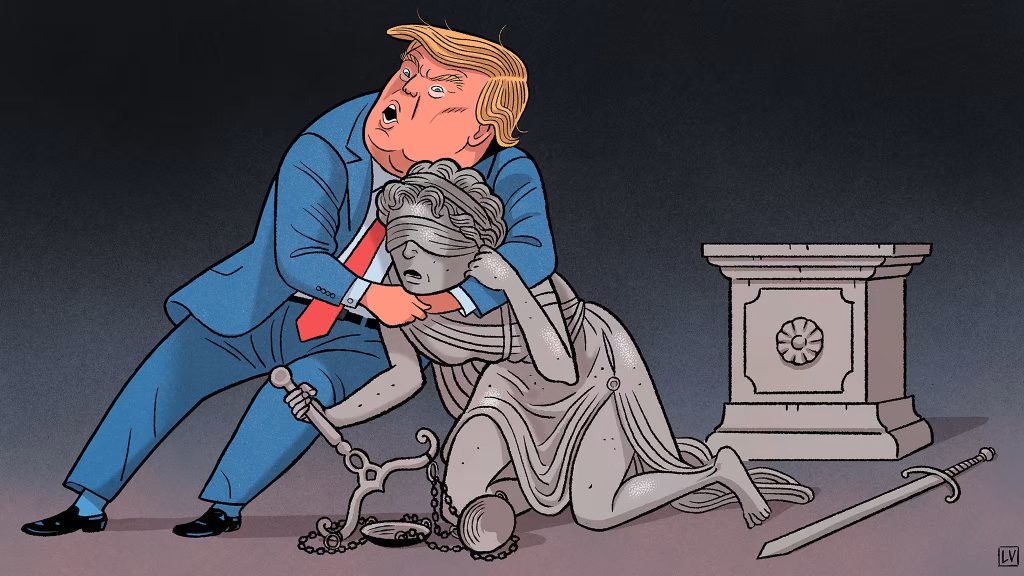
The thing about Trump is you never really know what he’ll do, even given the powers. I listened to his mini-press conference yesterday (after the Time magazine announcement and after he rang the opening bell at the New York Stock Market) and he was his usual self.
Trump isn’t even President yet, and already some people are starting to realize that they didn’t get quite what they hoped they were voting for. During his campaign, Trump promised angry consumers that his policies would “rapidly drive prices down” and “bring your grocery bill way down”. Unsurprisingly, Trump has now equivocated on that promise, declaring that “it’s hard to bring things down once they’re up.”
Conservatives hoped that Trump would crack down on the trans movement and stand up for a traditional view of gender, but now he says he doesn’t “want to get into the bathroom issue” and that he wants “to have all people treated fairly”. Many technologists hoped Trump would be a friend of technology and a foe of inefficient unions, and yet now Trump is condemning automation and siding with the longshoremen’s union:
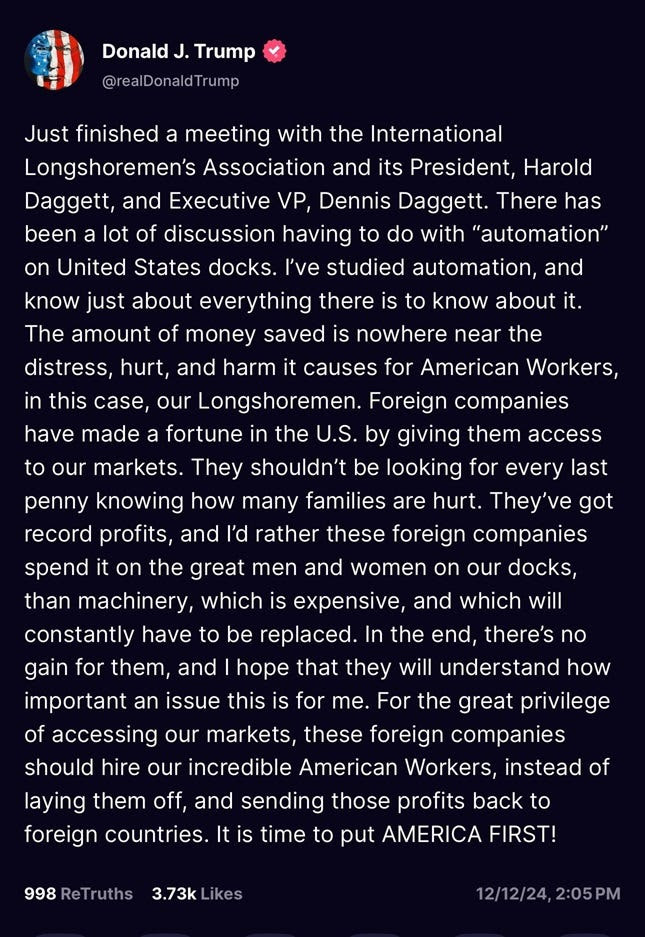
And so on and so on. This shouldn’t come as a surprise to anyone, of course — we’ve had almost a decade to watch Trump make promises and break them. Everyone knows that Trump follows his own whims, impulses, and personal interests, and that what serves as his ideology is actually just a set of instincts and vague ideas that cobbled together on his own while watching too much CNN in the 1990s. If you projected your hopes and dreams onto Trump when you pulled the lever, well, I guess that’s on you.
All in all, I’m not too worried about the state of the United States right now. Its economy is robust; even if Trump re-accelerates inflation by running big deficits and messing with the Fed, it probably won’t be catastrophic. Its society is slowly calming down from a decade of unrest. Climate change is a threat, but it’s mostly being caused by other countries, so even if Trump cancels green energy subsidies it’ll have only a marginal effect on the planet. A lot of long-term chronic concerns, like inequality, are certainly worth addressing but not as immediately urgent as we made them out to be in the 2010s. Trump may throw Ukraine under the bus, and though this would be a terribly immoral and reprehensible thing to do, it also won’t result in a direct threat to the U.S. Remember: for Trump, everything is a *transaction*.
And yesterday his transition team let it be known that they started to explore pathways to dramatically shrink, consolidate or even eliminate the top bank watchdogs in Washington. In recent interviews with potential nominees to lead bank regulatory agencies, Trump advisers and officials from his newfound Department of Government Efficiency have, for example, asked whether the president-elect could abolish the Federal Deposit Insurance Corp., people familiar with the matter said. Advisers have asked the nominees under consideration for the FDIC, as well as the Office of the Comptroller of the Currency, if deposit insurance could then be absorbed into the Treasury Department, some of the people said.
If true, that’s huge. Any proposal to eliminate the FDIC or any agency would require congressional action. While past presidents have reorganized and rebranded departments, Washington has never shut down a major cabinet-level agency and rarely closed other agencies like the FDIC that are not. Bank executives are optimistic Trump will ease a host of regulations on capital cushions and consumer protections, as well as scrutiny of consolidation in the industry. But FDIC deposit insurance is considered near sacred. Any move that threatened to undermine even the perception of deposit insurance could quickly ripple through banks and in a crisis might compound customer fears.
After several banks failed last year, customers panicked about whether their deposits were safe at smaller banks. Many fled to the biggest of big banks who are perceived to be so important that the government would never let them fail. Since then, banks have been calling for wider deposit insurance protections to keep smaller banks competitive.
But these discussions underscored the drastic approach Trump could take in his attempt to slash the size of the government and ease oversight, including for the highly regulated financial industry. Potential bank regulator nominees have interviewed with Treasury Secretary pick Scott Bessent and the new DOGE department, the outside advisory group co-chaired by Elon Musk and Vivek Ramaswamy, some of the people said. Musk last month also called for the elimination of the Consumer Financial Protection Bureau, an agency Republicans have long hated. “There are too many duplicative regulatory agencies,” Musk said.
Trump advisers and potential nominees have also discussed plans to either combine or otherwise restructure the main federal bank regulators: the FDIC, OCC and the Federal Reserve, the people said.
But as we noted earlier this month, it is all laid out in Project 2025, a policy document drawn up by the Heritage Foundation and former Trump officials, calls for the merging of the FDIC, OCC and non-monetary policy parts of the Fed, along with the National Credit Union Administration. Last night on Twitter, Rep. Andy Barr, a Republican from Kentucky and Trump ally on the House Financial Services Committee, has backed the plan to eliminate or drastically alter the CFPB and said he wants to get rid of what he calls “one-size-fits-all” regulation for banks.
Banks have a love-hate relationship when it comes to the oversight of multiple regulators. Some like it to the extent it can allow them to shop between regulators for a lighter touch. But they often complain about mixed messages and contradictory rulings.
It will be 🍿 time for most of this stuff, but one thing is sure: significant job cuts across the Federal government are coming.
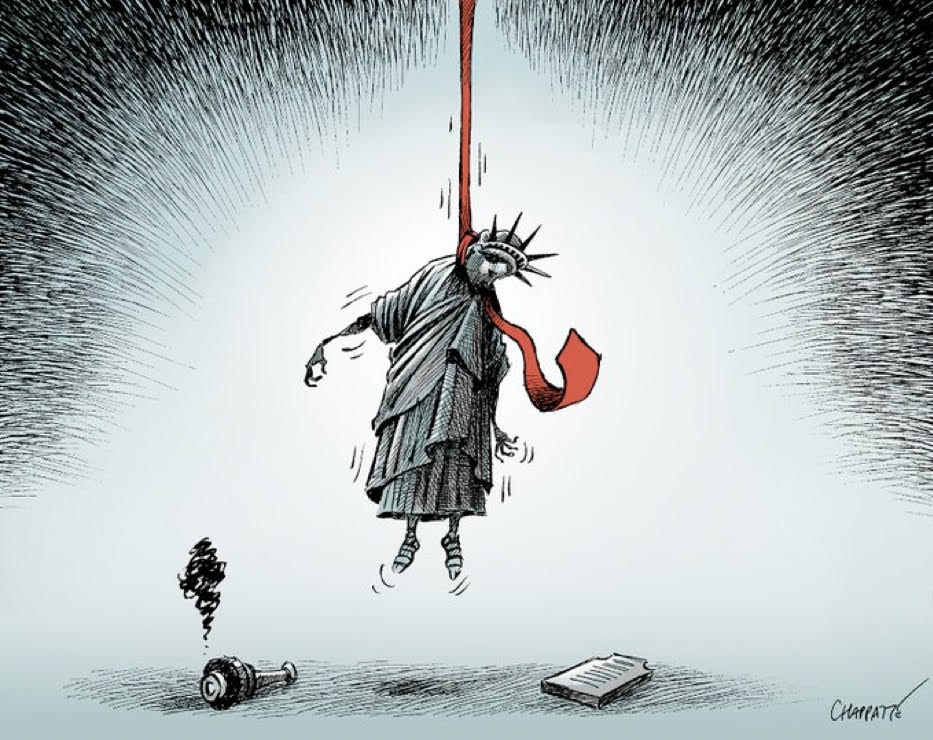
Very often you can open an envelope and take out something which bites or stings, though it isn’t a living creature. Worse is an email or a news alert on your timeline which has the same effect. Such was the news of Trump’s election.
My brain was full of spots of light and darkness, circling in confusion. And I thought “Logically, disasters should define us. Sheep learn from electric fences. Yet we humans, collectively, cannot make the same course correction”.
I looked at a lot of numbers this past week, the more granular analysis of the election. The whole country simply jolted to the right:
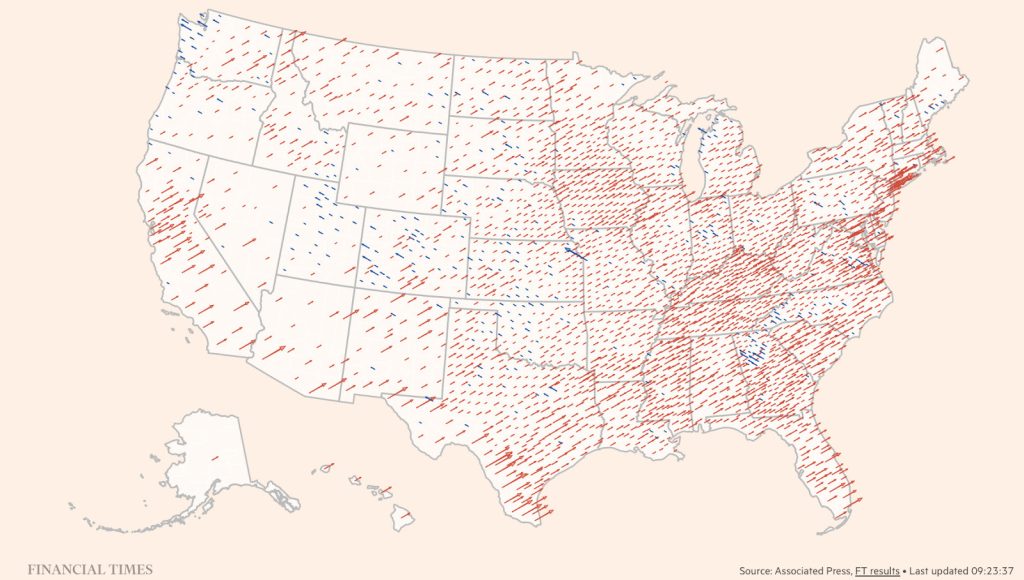
Trump moved every demographic rightward – except rich white women.
And one interesting thing about women … when you see the granular analysis, the first thing to say is that the surprise was not that we saw men, especially young men, moving to the right. That would have been pretty well predicted by the polls leading up to the election, and Trump’s media/targeted campaign messages. The surprise actually was that young women also moved slightly to the right. The expected gender gap was going to be men, especially young men, moving right, and women, especially young women, moving left, probably motivated by abortion and other issues. But that swing did not happen as predicted.
And the gap will grow. Some of the American census statistics on income, age and residence showed that most of the faster-growing states are red, and most of the slower-growing states are blue, according to the Census Bureau’s estimated state-by-state population changes between July 1, 2023, and July 1, 2024. Of the 10 states that experienced the fastest percentage growth in population from 2023 to 2024, the top five voted for Donald Trump in 2016 and 2020 and 2024: Florida, Idaho, North Carolina, South Carolina, and Texas. Two others in the top 10 also did well: Tennessee and Utah, both won by Trump in 2016 and 2020 and 2024.
These population-growth patterns are expected to continue for the rest of the decade.
This is not a serious country, but a country in serious crisis. This is not a sovereign country, but a country under the tyranny of the minority regardless of who is in charge. Yes, there are elections – but the country is moving in a different direction and elections may not matter.
And now, an even more brutal era dawns. America’s “tech bros” will now strut their stuff in the corridors of power. As Carole Cadwalladr noted in the Guardian, 2016 was the beginning and 2024 is the end. 2024 was just the January 6th attack on the U.S. Capitol completed. The first cycle of information disruption is complete. We’re through the looking glass.
This is something I have long written about but I want to borrow a phrase from Carole:
“Trump is a bacillus but the problem is the pipes”.
We cannot fix this. It began as a tear in the information space, a dawning realization that the world as we knew it – stable, fixed by facts, balustraded by evidence – was now a rip in the fabric of reality. And the turbulence that Trump is about to unleash – alongside pain and cruelty and hardship – is possible because that’s where we already live: information chaos.
The Democrats made a million mistakes, running a horrible campaign, and I highlighted many issues as the election year progressed. But I will not recount them now. But I will return to my last paragraph above: information chaos.
Assuming the Democrats can overcome the demographics running against them, the Democrats must develop and maintain a media ecosystem that’s as powerful as the one that gave the GOP a trifecta. They perfected their media ecosystem. I believe that propaganda never made anyone believe anything they didn’t already believe. If you’re a racist, you’re a racist. A white-power podcaster like Nick Fuentes can’t make it so.
But you need to see the problem in a more nuanced light.
The problem is that the Democrats don’t have a media ecosystem of their own with which to compete with the Republicans on a level playing field for voters who are not getting, and who are not capable of getting, good information on their own. The Democratic Party trusts, and relies on, the public too much. Facts and history must never be allowed to speak for themselves. The Democrats must speak for them.
And they need guts. Either the Democrats meant it when they said Trump is a menace to democracy and the rule of law – or they didn’t. Either they meant it when they said that now’s the time for choosing – or they didn’t.
Honestly, I’m not sure they meant it.
In response to Trump’s renewed threat to prosecute members of the Congress who investigated his attempted paramilitary takeover of the U.S. government, Adam Schiff, who sat on the panel, and who is now California’s junior senator, said: “I don’t think the incoming president should be threatening his political opponents with jail time. That’s not the kind of talk we should hear from a president in a democracy.”
What is this?
Politics or kindergarten?
Schiff went on: “Nor do I think a pardon is necessary for members of the January 6 committee. We are proud of the work we did … It was a fundamental oversight obligation to investigate the first attempt to interfere with a peaceful transfer of power in our history.”
Look, I am a cynic, a skeptic. But I have liked and defended the Democrats in various ways for years, and I give them kudos for standing up for democracy, the Constitution and the rule of law after Trump’s attempt to overthrow the will of the people. All dead, of course, but standing up for it gets some points.
But this is so weak, I can’t defend it. Nobody can.
Here’s what Schiff should have said:
Donald Trump is a criminal. It was criminal to lead an insurrection. It’s criminal to threaten jail time for his opponents. Trump is a criminal up and down, and criminals are bad for democracy, even when or especially when they are democratically elected. A criminal president is going to corrupt, even more than it already has been, the moral and legal fabric of American society. The Democrats, as the party of the rule of law and the Constitution, will do everything in its power to hold criminals accountable and to empower authorities to bring them to justice. The Democrats may lose in the end, but not without a fight.
Schiff could have said any of these things without losing any support back home. Instead, we’ve got “The Language Police” or “The Disappointed Schoolmarm”, take your pick, who not only failed to show resolve but also validated the allegation that the Democrats are a bunch of useless pricks.
Jesus Christ! January 6 was not “the first attempt to interfere with a peaceful transfer of power.” It was a crime. It was treason. But Schiff couched that fact in abstract multisyllabic words, as if euphemism and understatement were the appropriate mode of presidential discourse.
Worse was what the Senate minority leader said afterward.
“He did a great job [referring to Adam Schiff’s performance on the J6 committee] and it will stand for itself”.
No, it won’t, you idiot. You need to kick ass if you have any chance!! This is a kick-ass country, you moron!!
With the rightwing media apparatus, Donald Trump erased facts. With a new corrupt administration, he’ll try erasing history. And he will succeed if the Democratic Party does not speak for it and fight. So, hey, turn off the lights on your way out.

But I must also commend Trump for reminding me that racism, xenophobia, and misogyny are alive and well in many U.S. households and Martin Luther King Jr.’s dream that one day we will judge people primarily by the content of their character remains an elusive aspiration.
And, like many Americans, prior to Trump’s win, I honestly believed most Americans weren’t fans of vulgarity, profanity and disgusting language. But Trump set the record straight on that. Apparently, a lot of Christians are completely fine with all kinds of boorish behavior.
I also dimly remember my social studies class when I was child – dimly remember the teacher saying all Americans are equal before the law. You’ve probably heard that rumor, too. But as Trump demonstrated conclusively, some Americans can break the law repeatedly – committing crimes that would land most of us behind bars – and suffer no consequences. And furthermore, having a criminal record is now something many Americans celebrate and even cheer. Kudos to Trump.
And I bet many readers saw America as a “shining city on a hill”, as Ronald Reagan so eloquently put it a long time ago. Now we know that’s not the case. We are just as susceptible to being seduced by a corrupt, power-hungry, narcissistic, wannabe dictator as any other Third World country. Again, congratulations to Trump for exposing the cold, hard truth about who we are. There is no *American Exceptionalism*; we are not immune from evil, anti-democratic authoritarian leaders with fascist tendencies. So let’s stop pretending we’re something we’re not.
I will leave you with this, a quote I have used before. Hunter S. Thompson, writing in September 1972, a little over one month ahead of Nixon’s landslide reelection:
The polls also indicate that Nixon will get a comfortable majority of the Youth Vote. And that he might carry all fifty states.
Well … maybe so. This may be the year when we finally come face to face with ourselves: finally just lay back and say it — that we are really just a nation of 220 million used car salesmen with all the money we need to buy guns, and no qualms at all about killing anybody else in the world who tries to make us uncomfortable.
The tragedy of all this is that George McGovern, for all his mistakes and all his imprecise talk about “new politics” and “honesty in government”, is one of the few men who’ve run for President of the United States in this century who really understands what a fantastic monument to all the best instincts of the human race this country might have been, if we could have kept it out of the hands of greedy little hustlers like Richard Nixon.
McGovern made some stupid mistakes, but in context they seem almost frivolous compared to the things Richard Nixon does every day of his life, on purpose, as a matter of policy and a perfect expression of everything he stands for.
Jesus! Where will it end?
Nixon won 49 states.
And if every damn word of what Thompson wrote doesn’t ring true to you today, you’re deaf.